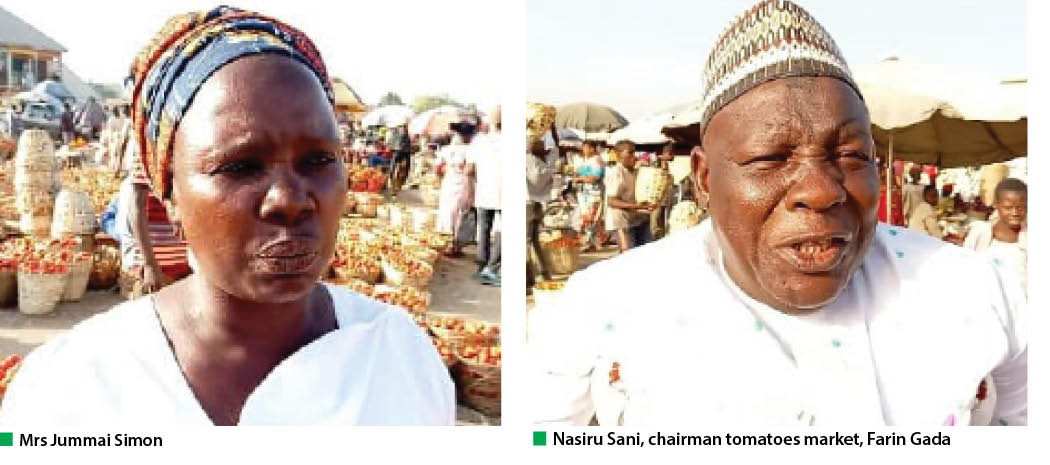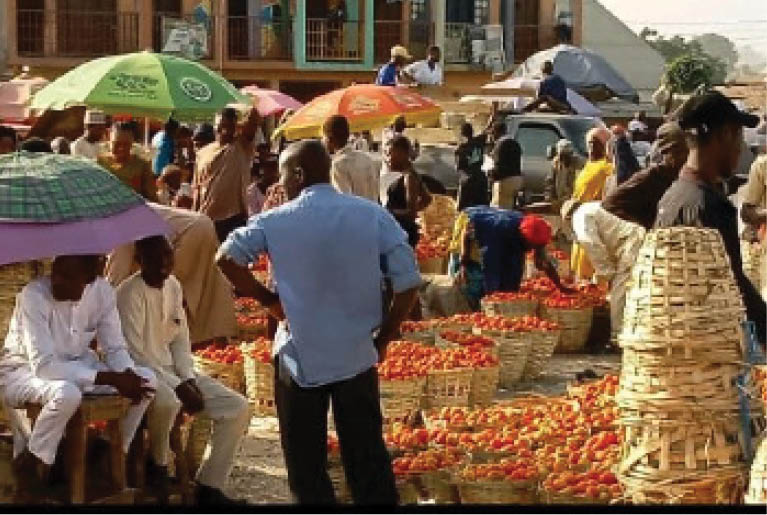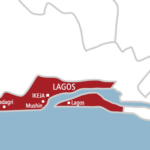Jummai Simon, a tomato farmer in Jos, is finding herself in a very difficult position due to the current situation of the price of tomatoes in the market, occasioned by the non-availability of the naira notes in the country.
Jummai, who brings her tomatoes to Farin Gada market, a popular perishable goods market, located in the heart of Jos North LGA of Plateau State, said they are already counting losses as the price of tomatoes continues to fall due to the scarcity of naira notes in the hands of buyers.
According to farmers in Jos, the scarcity of the naira notes is entirely the cause of the crash of the prices of vegetables.
Perishable goods such as tomato, cabbage, pepper, cucumber, among others, are often very challenging to handle, manage, store and maintain their qualities, adding that managing perishable products is not a simple task.
- Service for sale: How police commercialise security operations amid manpower shortage
- Breaking the glass ceiling: Women in journalism and Nigerian example
The scarcity of naira notes in the country is no longer news, and experts say the development is affecting virtually all sectors of the economy, leading to some small businesses losing their business capital.
The announcement of the deadline for transacting with the old notes continues to generate heated arguments among Nigerians with many saying the scarcity of both the old and new notes has crippled businesses in the country.

On a visit to the said market by our correspondent, prices of vegetables have come down drastically with many sellers complaining of low patronage due to the shortage of the naira notes in circulation at the moment.
Jummai, who puts the blame on the scarcity of the notes, said the quantum of the loss being experienced in the market could not be measured, especially if the situation continues.
“Honestly, we are in a terrible situation in this market. We were enjoying our tomato business when suddenly, the FG introduced the new naira notes and asked us to return the old notes to the back. People took the notes to the bank and hoped to get the new ones, but the banks refused to pay customers with the new notes.
“The refusal of the banks to give their customers the new notes is the major cause of the crash of perishable items in the market. A lot of customers can’t get the cash – both old and new, and so, they can’t patronise us, and subsequently, the items get rotten,” she added.
Jummai said tomato farmers at the end of the day sell the product for whatever price they are offered because if they don’t sell on time, the tomatoes would undoubtedly decay and they would lose even the invested capital.
“Tomato is a commodity that you cannot store, particularly the raw one. Unlike grains that can be preserved, vegetables become bad if not processed or sold on time. We don’t have storage facilities, which is why we are in pain now because people don’t have the money to patronise us. We are recording losses every day since this cash crunch started,” Jummai said.
Explaining further, she said “for example, when you buy a basket of tomato at the rate of N1000 from the farm, you will have to pay for transportation. By the time you bring it to the market, buyers will begin to price it N800. How will you get your initial capital back, talk more of profit?
“If you say, you are not selling it at first pricing, believing that another person will price it higher, you will see that the first pricing will be better because the next person will price it less because there is no cash, and everyone wants to sell and go. When you put your expenses together, you will see that you are running at a loss. We are in serious problem.
“We are begging the government to see us as people who participated in electing the government. Without us, they wouldn’t have been there. Let them have pity on the common man. Let them help us. We are in a difficult situation. Without the common man, there would be no government. We are calling on government with a loud voice to come to our aid.”
Solomon Albert, a potato farmer, also lamented how the scarcity of the naira notes has forced down the price of potato, making them lose their capital, as well as anticipated profit.
Albwrt explained that in January, 50Kg of potato was sold between N25000 and N30, 000, when people still had cash on them, noting that prior to the introduction of the naira notes, around November and December last year, the product was sold between N40,000 and N50,000.
He however said “Yesterday, it was sold between N14000 and N17000. That is terrible for the farmers considering how much they invested in the farm. People are losing their money. Even those that have the money in the bank cannot withdraw it.”
He said with the scarcity of the naira notes, the prices of the commodity now vary. “If you have money, you buy the product cheaper compared to those transferring the money.”
Another thing that is discouraging buyers from going to the market, according to Albwrt, was the exorbitant charges by the POS operators when buyers want to make transfers for the commodity bought.
“Again, many of the farmers don’t have bank accounts. If you want to transfer the money, they will not agree.”
Abubakar Abdullahi, another tomato farmer, who is also lamenting their losses, said “We bought fertilizer at a very expensive price to grow the products and hoped to sell it at a good price but our hopes have been dashed. People don’t have money. We are in serious crisis. Today, you can have N400 basket of tomato. How will we make profit from the farming?
“Aside that, even if you accept transfer, there are people who send you fake alert. This is worrisome because people are being cheated. We want the government to do the needful to ensure that naira notes are available so that businesses can thrive,” Abdullahi added.
For Muhammad Muhammad, a cabbage dealer, “We used to sell a 100kg of cabbage at the rate of N1, 000 when buyers pay in cash but today, the price has reduced to N600. We are calling on the government to address our plight because we are in a critical situation. If what they are doing is for our own good, let them also consider our situation, “ he added.
Nasiru Sani, chairman of tomato market of Farin Gada market, described the situation as disastrous, saying the development has affected the tomato business seriously. He said even though the policy may be good for the country but it wasn’t introduced at the appropriate time.
“People are losing their money. There are fake bank transfers everywhere. Farmers are being cheated by some buyers who will claim to have transferred money to them. Somebody just transferred N8000 instead of N80, 000. The man was subsequently arrested. So, the system is good but people are not enlightened. The major problem now is that even if you price the tomato and are asked to pay, you can’t get the cash. We are calling on government to do something about it.

 Join Daily Trust WhatsApp Community For Quick Access To News and Happenings Around You.
Join Daily Trust WhatsApp Community For Quick Access To News and Happenings Around You.

